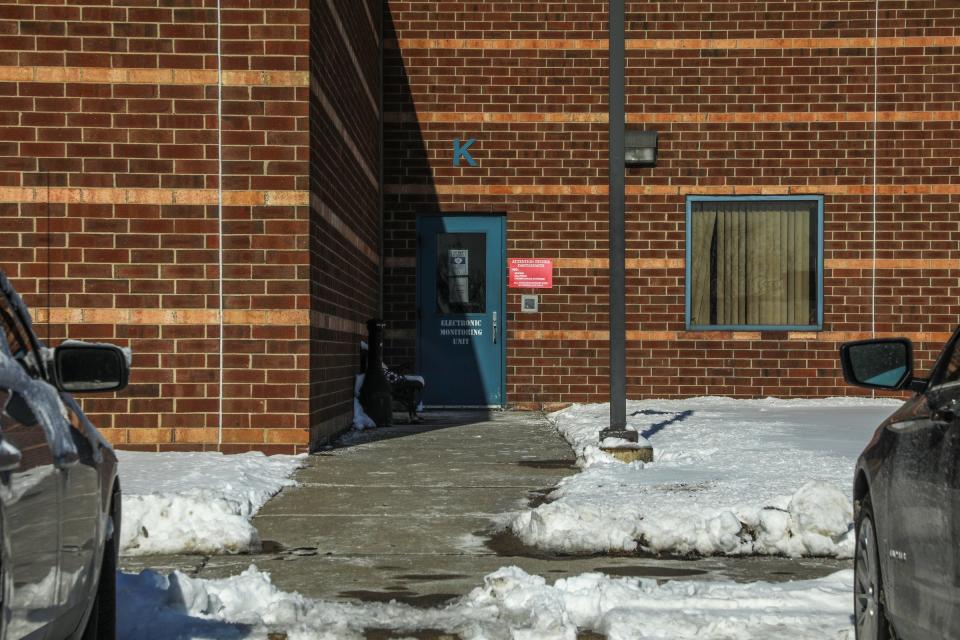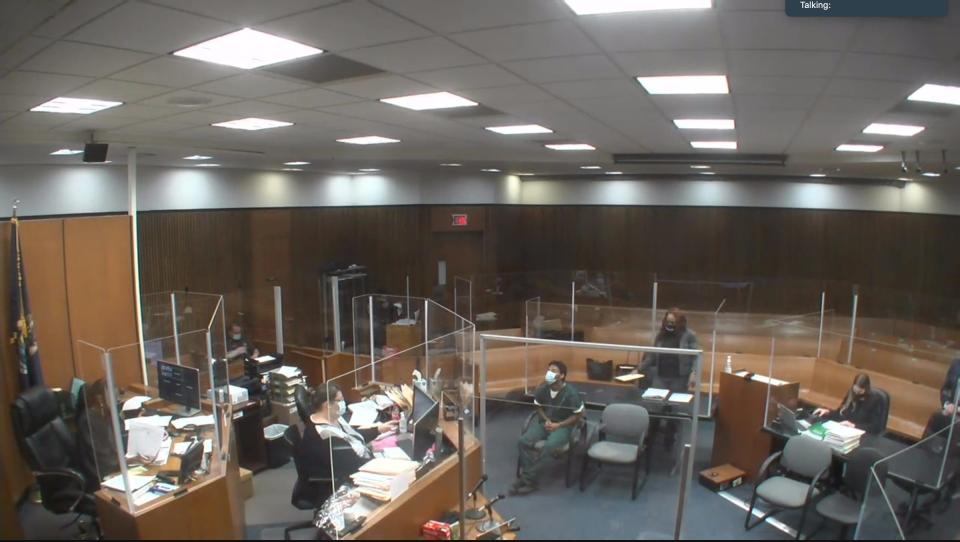Tether backlog in Wayne County keeps people in jail longer — even after posting bail
An untold number of people in Wayne County jails have been stuck behind bars for a week or more after judges ordered their release because of delays in fitting electronic monitoring devices, the Free Press has learned.
Wayne County during the pandemic has been placing nearly three times the normal number of people charged with crimes on tethers, strapping Sheriff's Office staffers and creating the delay.
Some of those in jail are still inside even after loved ones have paid the bond required to free them, according to defense attorneys, bail bond company staffers and jail union officials.
Jail officials say for most inmates the delay is not that long unless there are complications, but acknowledged the release process has slowed to three days from two or fewer before the pandemic. Those same officials did not provide exact numbers on how many inmates wait longer, saying that detail should be requested under the state Freedom of Information Act. The Free Press has a request pending.
Critics argue the additional wait for release can be unfairly punitive for those facing charges but presumed innocent. Days-long delays can cost defendants their jobs or reduce their ability to mount a defense. And having more people incarcerated can increase the chances of catching the coronavirus.
The Free Press found an example of a 26-year-old Detroit man accused of knowingly buying a stolen trailer who sat in jail for three weeks after his mom posted his bail, in part because he was waiting on a tether, according to records and interviews. He said he lost work and had to move in with family because of the delay.

"I think it's an outrage," said William Swor, a defense attorney and member of the Michigan Indigent Defense Commission. "People should be released when the court orders them released. There should not be a significant delay. Since the right to bond is a constitutional right. ... The question is, at what point does it become a constitutional violation?"
Union officials blame the tether backlog on low staffing, saying deputies in the tether unit often are tapped to help work in the jails. That makes it difficult to keep track of the nearly 1,700 people already on the devices, they said.
The current tether caseload is a nearly 170% increase from pre-pandemic averages of about 630 people on the devices countywide. And the tether population exceeds the approximately 1,460 inmates currently in the Wayne County jails.
"It's a safety issue," Allen Cox, president of the Wayne County Deputy Sheriff's Association, said of tether unit staffers. "They have extremely large caseloads."
It's not clear exactly how many people work in the tether unit.
Robert Dunlap, chief of jails for the Wayne County Sheriff's Office, declined to give a number but said that the department has "tripled the amount of staff that is budgeted" since the pandemic hit.
Union officials said they have about 15 members in the unit. In 2020, there were 22 staffers, including sergeants in the division, according to a budget document.
Complaints with the county’s tether backlog represent just a slice of broader criticism with electronic monitoring programs. Civil rights groups and mass incarceration opponents question the use of the devices to monitor nonviolent offenders, the fairness of the financial burden on defendants and whether tethers improve public safety. Proponents say the devices are a better option than incarceration and save the county money.
Dunlap acknowledged the release process has slowed to about 72 hours as judges ordered more tethers, primarily to reduce potential COVID-19 outbreaks behind bars and with the goal of moving more nonviolent offenders out of jail.
If the delay is longer, usually there are complications, such as when an accused person has warrants elsewhere or doesn't have a place to stay once released, Dunlap said. Many defense attorneys and family members don't understand the multistep tether process, he said, which can include programming in restricted locations, such as victims' addresses, and finding homeless suspects a place to live.
"I think our turnaround time is quite commendable given the volume of people that we process," Dunlap said. “To tell the true story about what’s going on here, this is a systemic issue with regards to delays in the criminal justice system in America."
The pandemic has periodically shut down area district courts, and Wayne County Circuit Court judges are still working a mix of in-person and remote operations, contributing to a backlog of cases. The circuit court has more than 5,900 felony cases awaiting trial. Pre-pandemic, the court typically had about 1,500 pending.
Delays are common, lawyers say
Lillian Diallo, a defense attorney and president of the Wayne County Criminal Defense Bar Association, said that over the past several months she has been getting more complaints from attorneys over tether delays.
“We are seeing five, seven days after bond is posted,” Diallo said. “As a lawyer you … have to do Herculean efforts to try and get people out.”
Even a three-day wait for a tether is unacceptable, said Deborah Choly, an attorney with Michigan Legal Services who helps monitor the sheriff's department's compliance with a long-standing inmate lawsuit first filed in 1971 over the poor conditions in the jails.
"Nobody is happy with any of this," Choly said. "It's outrageous."
Phil Mayor, senior staff attorney at the American Civil Liberties Union (ACLU) of Michigan, agreed that detaining someone for any significant period of time after they’ve been ordered released on a tether raises serious constitutional concerns. But he was unaware of any court rules or statutes that limit wait times for electronic monitoring devices to be put on once they are ordered. He suggested that if a tether cannot be handled within 24 hours, judges allow the person to go free and come back with an appointment at an appropriate time.
The Free Press talked to people involved with the system and combed through records to find several examples of release delays.
The man who spent three weeks in jail after his mom posted bond was Minya Irby's client this summer.
She's a bail agent with Banks Bail Bonds in Detroit and paid his $5,000 bail with his mom's help the day of his arraignment May 21 in Hamtramck's 31st District Court. He wasn't released until June 11.
"His mom was real upset," Irby said. "I remember telling her she needed to call the news."
The 26-year-old man's tether release on the stolen property case was delayed by another warrant he faced in Detroit for operating a vehicle while intoxicated, according to the Sheriff's Office.
The man spent nearly two weeks in jail after his bond was posted before he was arraigned June 3 in 36th District Court on the drunken driving charge.
It's not clear why the arraignment in the second case took so long. Diallo said that process should have taken only a few days.
According to the Michigan Attorney General's Office, in general, a person must be arraigned within 48 hours of an arrest, or within 72 hours on a weekend.
After he was arraigned, the man was eligible for the tether, sheriff's officials said. But the unit didn't get the arraignment paperwork detailing that 36th District judge's order, sheriff officials said.
"During this time frame, (the Sheriff's Office) was having some difficulty getting paperwork from various courts," Wayne County Sheriff's Capt. Jason Bates wrote in an email. "We don’t offer this as an excuse, but to paint the best picture possible of the issues at this time."
Officials with 36th District Court said the proper paperwork was sent the day of the arraignment.
The man waited eight more days in jail before he had another hearing on the stolen property case in front of Hamtramck Judge Alexis Krot, who originally ordered the tether. She removed the tether requirement on the stolen property charge and he was released the next day.
Krot, who is recovering from COVID-19, said by email that she couldn't comment on the case because she couldn't review the transcript. Her clerk, who would help her review the case, had also recently gotten sick with the virus.
A Free Press reporter spoke several times to the 26-year-old man, who said he wanted to get answers to why he remained in jail so long but feared being targeted by police for speaking out. He did not return more recent reporter phone calls. He said earlier he does home renovations and lost work and had to move back home with his mom because he was in jail so long.
Detroiter Page Cheatom said the tether backlog made a terrible situation worse after her arrest in November 2020.
The 24-year-old mother of four young children was fitted for a tether and released four days after her sister bailed her out of the Wayne County Jail, according to court records and sheriff's officials.
Then, last spring during her preliminary exam, a judge sent her back to jail and increased her bond, her lawyer, Arni Chambers, said. Cheatom got another tether and was released six days after her family paid her higher bond, according to records. Dunlap said it was a shorter turnaround than six days because the bond was paid in the late afternoon and she was released in the morning.
Cheatom faces a dozen charges, including assault with intent to commit murder, for an incident in 2020 involving an acquaintance. She maintains her innocence and is fighting the charges, Chambers said.
Cheatom said she lost work as a certified nursing assistant while she was in jail, had to move in with her sister and missed her 4-year-old son’s birthday — all made worse because she had to remain in jail after posting bail, she said. She said jail staffers told her it was because of the tether backlog.
“My mom and my sister kept calling up there and they kept telling them, ‘She’s not on the list today, she’s not on the list today. Call back tomorrow,’ ” Cheatom said. “It was the worst experience ever because we paid our money, why was we still waiting there so long for a tether?
“It made a lot of things worse.”
Dunlap said Cheatom is facing serious charges and in those instances there can be several additional steps that must be taken, including notifying victims.
"I think they did an excellent job," Dunlap said of the tether unit in Cheatom's case. "We certainly don’t want to expose the public to any undue danger or harm simply because we acted in haste to release someone who is still under the jurisdiction of the court."
Wayne County's tether caseload standouts
Wayne County Circuit Chief Judge Timothy Kenny said that he's aware of tether delays but reiterated that the process can take time.
"I understand the concern. … As a judge, if somebody has been ordered released, they need to be released as soon as possible to comply with the order," Kenny said. "But it does require that the sheriff department has to do a certain amount of due diligence before someone is released."

The process is crucial in order not to mistakenly release a suspect who faces serious charges elsewhere, Kenny said.
Wayne County is unique in metro Detroit when it comes to issuing tethers. Macomb County has about 60 people on the devices and Oakland had about 20 as of last month. Officials say tethers can be expensive and there are alternatives, such as having people report by phone or requiring regular drug testing.
Wayne County also has struggled to keep its jails habitable.
A doctor who inspected the county’s three jails in 2020 as part of a lawsuit over conditions related to the pandemic recommended the county stop housing inmates at the Division II facility on Clinton Street, sometimes called the Old Wayne County Jail, because of its severe disrepair.
In 2015, the Free Press reported that problems included malfunctioning fire alarm systems, overcrowding, a lack of medical equipment and a heavy stench of urine and body odor.
Construction of new adult and juvenile jails is underway as part of a $533 million Wayne County Criminal Justice Center that is expected to be completed later this year.
While many defendants awaiting trial in Wayne County jails may prefer release on tether, civil rights advocates and activists against mass incarceration argue the devices infringe on the liberties of the accused and are prone to delays and mix-ups over release conditions.
"Most people should neither be incarcerated nor heavily surveilled while they are awaiting trial at a time when they are still presumed innocent," the ACLU's Mayor said in regard to tether programs statewide.
Kenny defended the county's use of the devices.
"If tethers can be used in circumstances … in a case in which the public safety concerns are taken into account and the tether provides an assurance that the defendant is likely to show up for court or be readily located, it reduces the number of people who have to be incarcerated pretrial," Kenny said.
'Hours of time' not at tether address
The recent case of Detroiter Lamont Harvey has exposed problems within Wayne County’s tether unit that could compromise public safety and, critics say, result in the unfair treatment of those released on bond.

Harvey, 20, was bailed out in late October. But he was rearrested a couple of weeks later for breaking his house arrest, even though the tether unit said nothing about house arrest when he was released from jail, according to his lawyer, Alexandria Taylor. Now, a family friend who put up the deed to her house as collateral for his bond is worried she’ll lose her home.
What’s more, it took the county’s tether unit nearly two weeks to contact Harvey for violating his house arrest. Once the judge in Harvey’s case found out, she ripped the Sheriff’s Office for not finding him sooner as a matter of public safety.
"I know the caseloads that we are dealing with because to be fair this makes the Sheriff's Office look horrible," Wayne County Judge Darnella Williams-Claybourne said during a hearing in Harvey’s case in December. "This just proves the fact that there are all these violations, if you will, and on all of these days, these ... hours of time where he's not at his tethered address, and no one calls."
Harvey’s ordeal with the tether unit began when his mother unexpectedly died last October. He had been charged in May with assault with intent to murder for allegedly shooting another man in the leg.
Determined to bail him out so he could attend services for his mother, Harvey's friends and family scraped together a $7,500 down payment and put up the deed to a friend’s house in northwest Detroit as collateral. Harvey left the jail Oct. 27.
“A couple days later he was at his mom’s funeral, you know, he was hugging me, thanking me,” said Trina Stanley, 41, who put up her house. “And then the next thing I know, they came and picked him back up because they said some paperwork wasn’t signed or he didn’t follow the rules.”

The confusion started during a bond hearing in September when Williams-Claybourne set the conditions of any future release of Harvey.
The judge verbally ordered that Harvey be on house arrest if and when released, but a written order memorializing her decision in writing was not immediately filed. Taylor herself was left to rely on her memory of the judge’s conditions on her client because she didn’t receive written notification of Harvey's house arrest until Nov. 10, weeks after the September bond hearing and the very day he was returned to jail for leaving his home, Taylor wrote in an emergency court filing urging his new release.
Kenny , the chief judge, said that an order is normally signed the day a judge issues a change in bond so that the Sheriff's Office is made aware of the conditions.
Williams-Claybourne and the prosecutor in the case both said in court during the hearing after Harvey's rearrest that the verbal order should have been enough.
Further confusing matters, the release documents Harvey received on his way out of jail said nothing about house arrest. “GPS tether prior to release” was the only condition listed. Copies of the documents show that Harvey also did not sign them, suggesting he was not given proper tether instructions, Taylor said.
Harvey occasionally left his house with the tether attached in the days following his mother’s funeral.
When the tether officer arrived at Harvey’s home to look into his house arrest violation, the officer saw that Harvey’s release documents said nothing about house arrest.
The tether officer was called to testify in December about the paperwork mix-up, and he said that he called a sergeant and they agreed to give Harvey a warning, telling him to remain on house arrest going forward.
But when Williams-Claybourne discovered that Harvey had violated house arrest, she instructed the Sheriff’s Office to apprehend him. As of the publication of this article, Harvey was still in jail, despite the costly bond his friends and family posted late last year.
Stanley said she doesn’t know whether she is in danger of losing her home.
“It just defeated the whole purpose, because he ain’t out here and I don’t have my deed,” she said.
Taylor said her client is being punished for a miscommunication involving the county’s tether unit.
Harvey shouldn’t be expected to remember the judge’s verbal order in September that he remain on house arrest, Taylor said, especially because the jail documents provided to him when he posted bond in late October said nothing about that requirement.
“He’s young and all the things that have happened, and you’re saying, ‘OK, I have this tangible piece of paper and tells me what my requirements are and my tether officer gave this to me and said, "Make sure you follow this." I’m supposed to question this and then remember what you said to me two months ago?' It’s an unreasonable burden to put on any defendant," Taylor said.

Williams-Claybourne declined an interview request because she is not allowed to discuss cases pending in her court.
Dunlap, the chief of jails, said the incident was an isolated mistake and commended the officer for acknowledging the error. He also touted what he said was a low absconder rate of below 4% on the tether, which is the percentage of cases where the unit needs to pursue people who cut the devices off or fail to keep batteries charged.
"Wayne County Sheriff's Office runs what I believe is the very best electronic monitoring unit in the state," he said.
But Irby, the bail bonds agent, said as the tether demand grows, it is necessary to rethink how the unit runs, including possibly working with tether companies to help handle the increase.
"You are talking about a system, a structure that is understaffed and overpopulated," Irby said. "Something needs to change."
Contact Christine MacDonald: cmacdonald@freepress.com or 313-418-2149. You can follow her on twitter at @cmacfreep.
Contact Joe Guillen: jguillen@freepress.com or 313-222-6678. You can follow him on Twitter @joeguillen.
This article originally appeared on Detroit Free Press: Tether backlog keeps people in Wayne County jail held longer

